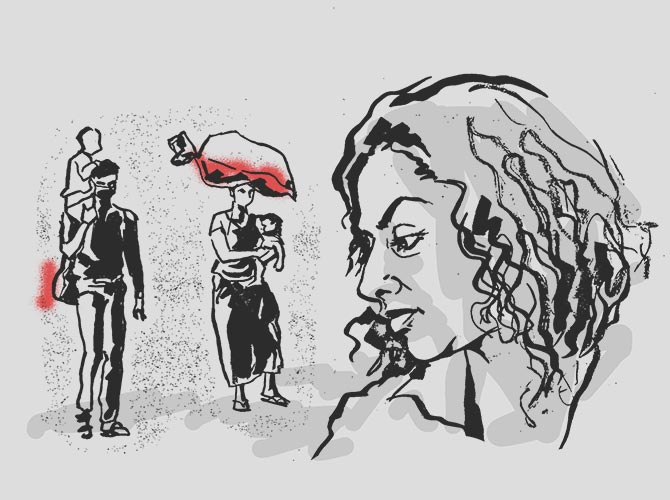 | « Back to article | Print this article |
In the midst of all the self-flagellation at our collective inability to assist the country’s migrants through their misery, at least one person (or a group of people) decided to do more than just chest beating.
Anjuli Bhargava traces the tale of how a relief effort in Goa is transforming into a movement to drive long-term change.

A few days into the lockdown, as Miriam Koshy, 43, an artist based in Goa’s Panaji was watching the mayhem unfold like the rest of us, she received an SOS message on her Goa Institute of Management alumni group.
A group of around 200 migrant labourers was stranded in an area close to her, with no means whatsoever as all construction activity and jobs they were engaged in had ground to a halt.
Koshy and a small group of volunteers decided to step in and began to do relief work, similar to movements one has seen across the country.
The first few weeks saw an intensifying of relief efforts as the numbers seemed to swell all the time.
Once the strict lockdown eased, some migrants began to leave for home.
Koshy and her volunteer group continued to map the migrants, help them get access to any government relief, get onto the trains and buses wherever possible while keeping up the food-relief efforts.
In addition, the group mounted an effort to increase awareness of the centrally sponsored schemes for the migrants as and when they reached home.
But Koshy also noticed that a fairly large number of migrants stayed back either from choice or compulsion.
It became quite evident as the days flew by that the only way for these workers to survive was to find work for them to do.
Neither charity nor government helplines would suffice to meet their needs going forward.
That’s when she and her team identified three clear gaps.
An acute shortage of water in the summer of 2019 had brought home the need to set up home rain-water harvesting systems to even those previously sceptical or didn’t know how.
Then, before the rains every year, almost all Goans looked to re-lay or fortify their roofs, often made from tiles.
And more recently, the lockdown had generated a renewed interest in home vegetable gardens.
All three activities required some outside guidance, both consultation from those with the technical know-how and labour.
Moreover, all over the state, the elderly were stuck without any assistance and many needed support including for domestic work.
Within days and with support of some techies in the area and her team working overtime, the COGOLD (Covid Outreach Goa Online Labour Directory) sprang up, acting as a link between those requiring assistance to those offering it, much to the relief of the latter who didn’t want to survive on charity and found meaningful occupation for their time.
But even as COGOLD was falling in place, Koshy came across a group of 70 labourers from Madhya Pradesh, who tried to walk across from Goa in a bid to return home but were accosted and sent back by the police.
The group was highly disturbed with many of them threatening to take their own lives.
That’s when COGOLD sought the support of Caritas Goa, a charitable trust that put together a team of counsellors.
Initially, the migrants refused to speak to the counsellors, arguing that they didn’t want to speak to anyone and just wanted to go home.
But over the next six days, more than 50 members of the group relented, many grown men sobbing openly.
Calls from their homes were not helping matters as their wives and parents couldn’t comprehend why they didn’t simply come back.
As primary bread-winners in their family, the question often posed was, “what happens to us if something happens to you?”
Watching the plight of those who stayed back, many gaps hit home, the biggest being the lack of awareness of their rights among the migrants and labour.
That’s when Koshy and her team decided to metamorphose COGOLD into COG (Change On Ground), to drive lasting change through action, awareness and advocacy.
“Someone has to help them better their lives and demand what they are due,” explains Koshy.
I chose in my column to highlight this instance for a few reasons.
One, in the midst of all the self-flagellation at our collective inability to assist the country’s migrants through their misery, at least one person (or a group of people) decided to do more than just chest beating.
But unlike many others, it didn’t just stop at relief work.
A deeper dive will hopefully help COG effect real change so that history doesn’t repeat itself.
Two, if Goa can do it, so can other states with equally committed and educated citizenry.
And last but not least, it’s been a delight for me to encounter Koshy who appears to have grown many years beyond her age within a matter of just a few weeks.
When I ask her how she’ll find time for her art going forward, her reply is, “good question”.
For now, she’s perfected the art of time well spent.